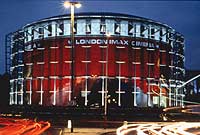
THE
MATRIX RELOADED -
THE
IMAX EXPERIENCE
Many
of you will already be IMAX fans. If you are you can skip the next
paragraph or two.
 IMAX
is a film format that's much larger than conventional film (each frame is
the height of a 70mm frame), offering much better picture quality than
you'll see in your local fleapit. IMAX films are shown on special
projectors on a huge screen (the one at Waterloo is eighty-five feet wide,
and five stories high, with a six-channel audio system capable of
delivering a jaw-dropping 12,000 watts of digital sound). Additionally,
IMAX theatres are designed so that every seat has an uninterrupted view of
the screen, enabling viewers to completely fill their field of vision with
the movie. IMAX
is a film format that's much larger than conventional film (each frame is
the height of a 70mm frame), offering much better picture quality than
you'll see in your local fleapit. IMAX films are shown on special
projectors on a huge screen (the one at Waterloo is eighty-five feet wide,
and five stories high, with a six-channel audio system capable of
delivering a jaw-dropping 12,000 watts of digital sound). Additionally,
IMAX theatres are designed so that every seat has an uninterrupted view of
the screen, enabling viewers to completely fill their field of vision with
the movie.
Generally
IMAX theatres screen short films, usually documentaries, especially-shot
to take full advantage of the stunning picture quality offered by the
format. A new technique called IMAX DMR (IMAX Digital Remastering) has
enabled conventional 35mm films to be transferred to IMAX format. The
process involves scanning the 35mm film, frame-by-frame, in high
resolution. Then the image is treated using proprietary image-enhancement
software tools, and transferred to IMAX format. The audio is remastered
for the IMAX format, too. Unlike the sound in conventional cinemas, IMAX
audio is uncompressed, and offers full dynamic range.
A
couple of Disney animated films have been transferred to IMAX format using
the DMR process, and now they're joined by a live-action Hollywood
blockbuster: The Matrix Reloaded.
 So...
how does The Matrix Reloaded look, on the giant IMAX screen? It's
simply astonishing, especially considering that the film probably wasn't
designed to be seen in such clarity and detail. The size of everything is
almost overwhelming. It's likely to cause conniptions amongst actors and -
especially - actresses, whose every pore, wrinkle and blemish is magnified
to enormous proportions (and, in the case of Laurence Fishburne, it ain't
pretty!) The film features many shots which convey cavernous locations,
which look spectacular, especially considering that many of them were
probably computer-generated. So...
how does The Matrix Reloaded look, on the giant IMAX screen? It's
simply astonishing, especially considering that the film probably wasn't
designed to be seen in such clarity and detail. The size of everything is
almost overwhelming. It's likely to cause conniptions amongst actors and -
especially - actresses, whose every pore, wrinkle and blemish is magnified
to enormous proportions (and, in the case of Laurence Fishburne, it ain't
pretty!) The film features many shots which convey cavernous locations,
which look spectacular, especially considering that many of them were
probably computer-generated.
Watching
a film on such a large screen certainly engages the senses to a degree
that an ordinary presentation isn't able to match. In some shots there's
something going on in every square foot of the screen, forcing the eyes to
travel all over the screen. Simple close ups are fascinating, enabling the
viewer to experience their idols in a whole new way. Two-shots seem like
you're standing right next to the characters. And the action scenes? Wow!
"Spectacular" doesn't really begin to do it justice.
The
film's audio mix is beautifully reproduced. There's so much power that the
sound is all-enveloping, without feeling that the equipment is being
strained, or - a common fault in even the best West End cinemas - that the
venue itself is adding it's own acoustic distortions to the mix.
 There
are minor flaws to the format, although you'll need a very keen eye
to spot most of them. There are occasional signs of compression (areas of
the picture not moving quite as naturally as they should, and a slight
pulsing on some picture details). I stress again, though, that 99% of
viewers probably wouldn't notice them. More obvious are the shortcomings
of the film itself. These include some shots with obvious CGI enhancement,
which would probably escape drawing attention to themselves on a
conventional screen. They'd probably be eliminated entirely if a film was
produced knowing that it will end up on IMAX screens. (Some extra texture
and detail was added to presentations of The Lion King and Beauty
and the Beast for their IMAX engagements, for example). The other
problem I noticed was film dirt, which seemed to accumulate as the film
unspooled. Tiny dust particles would go unnoticed in a conventional
presentation, but amplified by the IMAX process, they're sometimes very
distracting, especially as the rest of the image is virtually flawless
(grain levels are about the same as you'd expect from an ordinary movie
presentation). There
are minor flaws to the format, although you'll need a very keen eye
to spot most of them. There are occasional signs of compression (areas of
the picture not moving quite as naturally as they should, and a slight
pulsing on some picture details). I stress again, though, that 99% of
viewers probably wouldn't notice them. More obvious are the shortcomings
of the film itself. These include some shots with obvious CGI enhancement,
which would probably escape drawing attention to themselves on a
conventional screen. They'd probably be eliminated entirely if a film was
produced knowing that it will end up on IMAX screens. (Some extra texture
and detail was added to presentations of The Lion King and Beauty
and the Beast for their IMAX engagements, for example). The other
problem I noticed was film dirt, which seemed to accumulate as the film
unspooled. Tiny dust particles would go unnoticed in a conventional
presentation, but amplified by the IMAX process, they're sometimes very
distracting, especially as the rest of the image is virtually flawless
(grain levels are about the same as you'd expect from an ordinary movie
presentation).
I'd
thoroughly recommend seeing The Matrix Reloaded on the IMAX screen
if you have the opportunity, even if you've already seen it in an ordinary
cinema (and, after seeing the IMAX version, it will seem like a very
ordinary cinema!). Sadly, it seems that the film will mainly be shown in
London only.
Hopefully
The Matrix Reloaded will be the first of many A-Grade blockbusters
that will be shown in the IMAX format (where do I sign to see the Lord
of the Rings trilogy?!)
For
more details about the bfi London IMAX cinema, visit the website,
or contact the box office on 020 7902 1234. Tickets are £11.50, with
concessions at £10.50. The film will be screened between the 4th of July
to the 26th of October. (Visit the website for more details)
|
